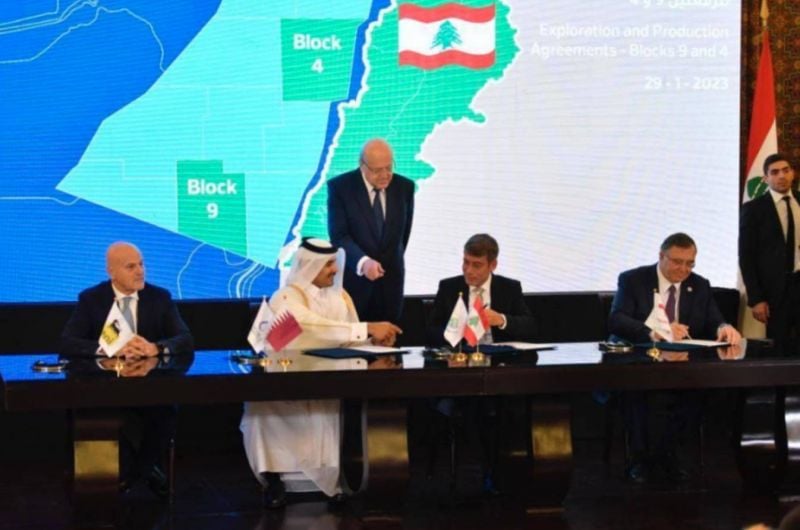
Lebanese Prime Minister Najib Mikati overseeing the signing of an agreement with QatarEnergy for the exploitation of offshore gas in Lebanon, along with TotalEnergies (France) and Eni (Italy). (Credit: Mohammad Yassine/L'Orient Today)
Over five and a half years after signing contracts for rights of exploration and exploitation of offshore hydrocarbon reserves in Block No. 4 of Lebanon’s Exclusive Economic Zone (EEZ), the consortium led by TotalEnergies has decided to withdraw and cease its operations on the site.
The consortium also includes Italian energy company Eni and QatarEnergy, which replaced the Russian company Novatek last summer. According to a ministerial source, the consortium "had until midnight on October 22nd to indicate its intention to maintain its license for Block No. 4, as per the agreement signed.”
The consortium did not renew its license, and “the exploration and exploitation rights in this block now belong to the Lebanese state and will be put back on the table in the next bidding round," explained the source.
Block 4 was the first in Lebanese waters to undergo exploratory drilling since the first round of license bids in February 2018. A well, with a depth of 4,076 meters, was drilled in the spring of 2020 by the Tungsten Explorer drillship, chartered by the company Vantage Drilling. The Minister of Energy and Water at the time had stated in April 2020 that the results of this well indicated the presence of gas, though not necessarily a commercially exploitable deposit. Since then, the consortium has yet to communicate its intentions for this block.
However, the ministerial source remains optimistic: "This drilling aimed to analyze the geological layers in Block No. 4 and compare them to those off the coast of Israel, where there have already been discoveries. The results show that the nature there is different. Yet, this is not necessarily a bad sign. Further drilling in other areas of this block will be needed to gain more clarity."
The confirmation of the consortium's disinterest in Block No. 4 comes about ten days after it completed its drilling activities in Block No. 9, located to the south of the Lebanese EEZ, for which it had also obtained a license in February 2018. While similar to Block No. 4, the consortium did not find a commercially significant amount of gas after reaching a depth of 3,905 meters. But the drilling confirmed that the nature of the geological layers is the same as to the south of the border, where gas discoveries have already been made. The deadline for these three companies to confirm their interest in Block No. 4 and 9 is May 2025.
Three Scenarios
The consortium is also the only party to have participated in the second round of bidding for exploration and exploitation licenses for all blocks except No. 4 and 9. At that time, it expressed interest in Blocks 8 and 10, located on either side of Block No. 9 in the south of the Lebanese EEZ. While the application deadline closed on October 2, the Lebanese state still needs to decide on the next steps.
According to Marc Ayoub, a research associate at the Issam Fares Institute at the American University of Beirut, the Lebanese government has three options: "Either it accepts granting licenses for Blocks Nos. 8 and 10, with conditions similar to those granted for No. 9, which took into account the risks related to the absence of maritime border demarcation in the south and the lack of data on the nature of geological layers in this area. Or it grants these licenses but negotiates with the consortium to try to increase its share of profits, based on the fact that maritime border demarcation has been completed, the consortium has data from the drilling in Block No. 9, and a 3D seismic study of the seabed in Block No. 8 was launched at the end of August last year. Or it rejects either of these options and initiates a third procedure for awarding the license for these two blocks."
In all cases, if the consortium's disinterest in the other blocks, including No. 4, implies launching a third round of bids, it remains unclear whether Blocks 8 and 10 will be included and whether the ongoing conflict between Hamas and Israel and consequential border tensions in southern Lebanon will further delay the process.
This article was originally published in French in L'Orient-Le Jour.